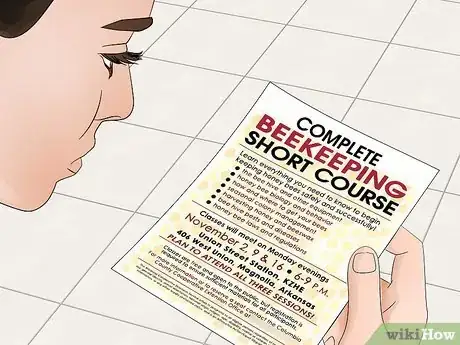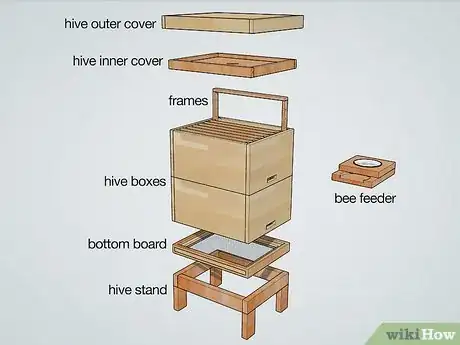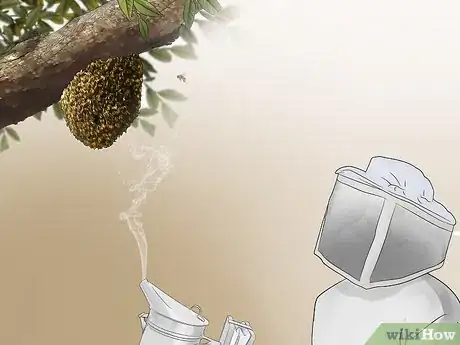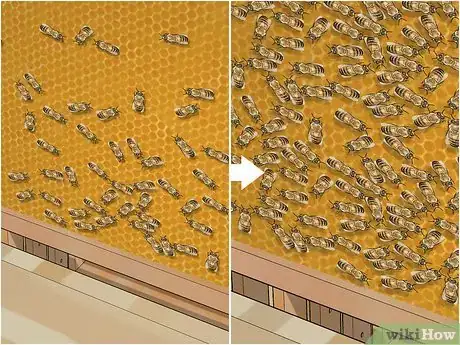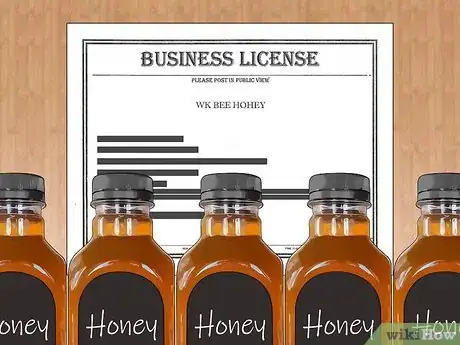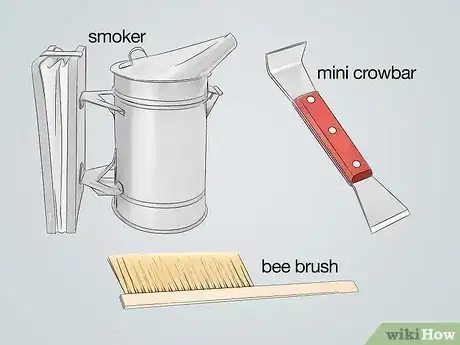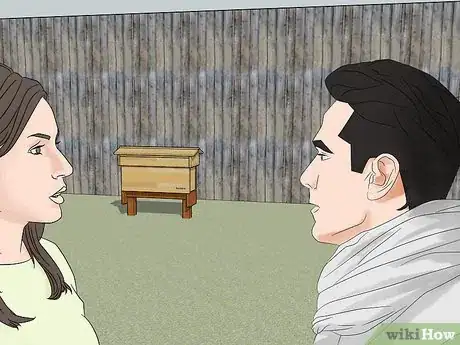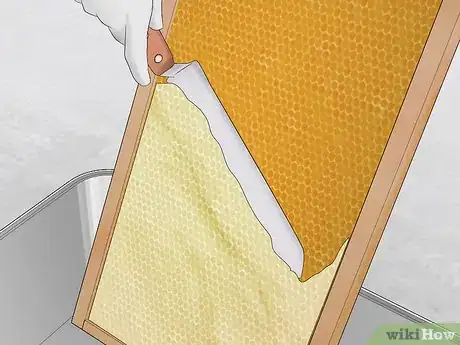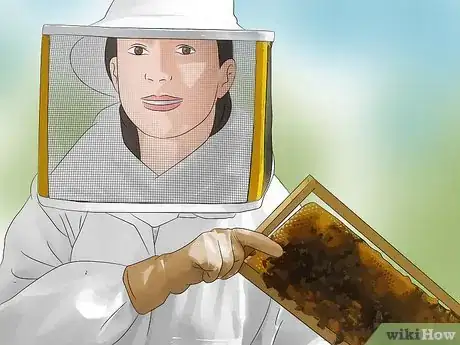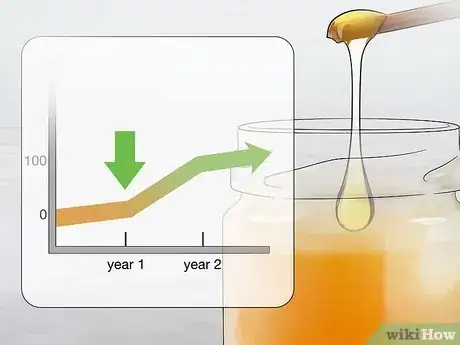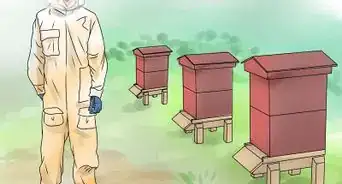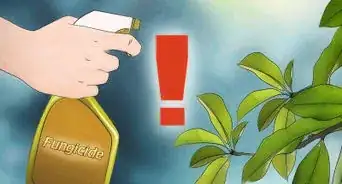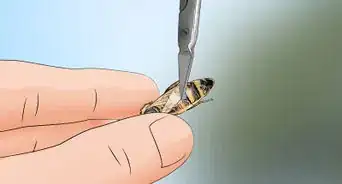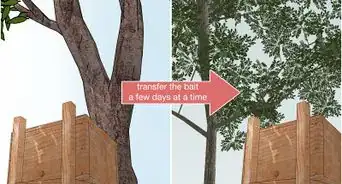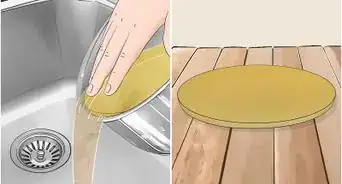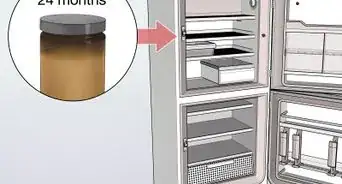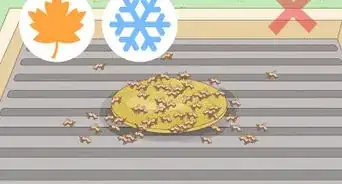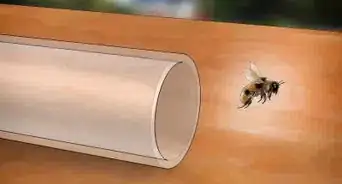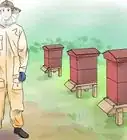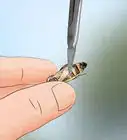This article was co-authored by David Williams and by wikiHow staff writer, Eric McClure. David Williams is a Professional Beekeeper and Bee Removal Specialist with over 28 years of beekeeping experience. He is the Owner of Bzz Bee Removal, a bee removal company based in the San Francisco Bay Area. Bzz Bee Removal locates, captures, and transports bees to local beekeepers to prevent colony collapse disorder.
There are 14 references cited in this article, which can be found at the bottom of the page.
wikiHow marks an article as reader-approved once it receives enough positive feedback. This article received 11 testimonials and 93% of readers who voted found it helpful, earning it our reader-approved status.
This article has been viewed 149,757 times.
Whenever you see a bee buzzing by, it’s probably hard at work pollinating plants, sustaining the crops we eat, and producing honey. Bees play a critical role in our ecosystem, and beekeepers help these interesting bugs thrive. Some of them even make money doing it, since they can harvest and sell the excess honey the bees produce! If you want to pursue beekeeping either as a career or hobby, you’re in luck! There typically isn’t a whole lot standing in your way other than a little hard work, knowledge of bee behavior, and a swarm of your own.
Steps
How do I actually get the bees?
-
1Most beekeepers just buy their first set of hives. You can have a hive shipped to you from a larger beekeeper. A hive will typically run you $150, but it’s a one-time buy since the bees will reproduce. This is generally seen as the best way to acquire your bees, since they’ll be used to humans handling them and they’ll be disease-free when they arrive.[4]
- You can order package bees, or a nucleus hive. Package bees are live bees that you add to a brand new hive. A nucleus is a half-colony that comes with a portion of the honeycombs, which will jumpstart growth. Either option is fine, but package bees are generally considered safer.
-
2You can collect a wild swarm if you can find one and it’s legal. This is often more art than science. Once you find a hive, you can use a smoker to calm the bees, and guide them directly off of the honeycombs into a container. If the bees are on the ground, you can use a sheet of cardboard to scoop them up. Regardless, you’ll need to scoop up nearly the entire swarm, and transfer them to your hive.[5]
- If you go this route, you must wear a beekeeper’s outfit and utilize a smoker to prevent the swarm from attacking. Taking a colony away from its hive is going to upset the bees, and you may be stung if you don’t wear any protective gear or use a smoker to cool the bees down.
- This is illegal in some jurisdictions. Check with your state and city first before you start peeling a bee hive off of a tree trunk.
- Many wild bees carry diseases, which is the key reason beekeepers typically buy their hives. If you collect multiple hives and one of them is carrying a disease, you may have a disaster on your hands.[6]
-
3Your hives will multiply over time, so don’t buy too many at first! As your colonies grow and flourish, a hive will eventually run out of space. When this happens, the bees will begin to swarm, and split itself in half. The portion of the bees that leave the original hive will choose a new queen and start a new colony. As a result, you shouldn’t run into a shortage of bees after you buy your first set of hives.[7]
Do you need permission to keep bees?
-
1Unless you live in a major city, it’s usually fine to just get started. Check with your local agricultural department to make sure, but if you aren’t living in a major city, there usually aren’t any applications or anything you’ll need to submit. In some areas, there are no beekeeping regulations at all.[8] You will typically need to register your hive with the state once it’s established, though.[9]
- It isn’t normally illegal to keep a beehive in a major city, but you often need to file for permits and you’re typically restricted on how many colonies you can have. This process isn’t typically very tenuous, though. You usually file an application and then an inspector checks out your plans and space.[10]
-
2You will probably need permission to sell your honey. Honey selling is regulated differently in every state, but you may need to get a health inspection and a business license before you can start selling anything. However, some states don’t treat honey sales the way they treat other food products or businesses, so be sure to look up the laws where you live![11]
- Some states treat local honey as a “cottage food.” Cottage foods are products that you’re allowed to sell without a food or health inspection, and you occasionally don’t even need to register a business. This is why bake sales aren’t treated the same way as food trucks![12]
How do beekeepers make money?
-
1Beekeepers will harvest and sell their hives’ excess honey. There’s a huge market out there for local organic honey. Once a hive starts producing a ton of honey, beekeepers will collect it, bottle it, and sell it to local shops or private buyers. Selling the honey usually isn’t enough to make a full-time living, though. Many beekeepers will also sell their leftover beeswax, and offer services to remove established hives from people’s yards.[16]
- Honey sales are regulated the same way as any other business; don’t assume you can just harvest honey and start selling it without registering and creating a business!
-
2Many beekeepers don’t make money—they do this as a hobby! A lot of beekeepers, if not most of them, maintain their hives simply because they enjoy beekeeping. Some beekeepers do it just so they have a source of honey for themselves! You don’t have to start a business here, so if you just want to keep bees, go for it![17]
- Bees perform an important service in the environment, and you’ll be doing your local ecosystem a huge favor if you start keeping bees!
How much do beekeepers make per hive?
-
1It can vary, but expect to make $600 per hive every year. While there’s obviously going to be some variation from hive to hive, a single swarm of bees is capable of producing roughly $600 worth of honey per year. However, a lot of your potential profits depend on the local demand for organic honey in your area. Still, $600 a year is a reasonable goal if you’re motivated.[18]
- Many beekeepers make deals with local grocery stores to sell their honey on their shelves, or go to farmer’s markets to sell their products directly to the public.
-
2You probably won’t make anything your first year. It takes most hives roughly 1 year to get established and comfortable enough to produce honey for you to harvest and sell. It depends on the weather where you live, the amount of nectar in your area, and the type of bees you’re keeping, but it’s safe to assume you won’t make very much money your first year.[19]
Community Q&A
-
QuestionCan I have a bee hive in Norway?
 wikiHow Staff EditorThis answer was written by one of our trained team of researchers who validated it for accuracy and comprehensiveness.
wikiHow Staff EditorThis answer was written by one of our trained team of researchers who validated it for accuracy and comprehensiveness.
Staff Answer wikiHow Staff EditorStaff AnswerYes, but there are a lot of laws and regulations in Norway when it comes to beekeeping. Look up your local laws and contact your agricultural department to find out what you'll need to submit.
wikiHow Staff EditorStaff AnswerYes, but there are a lot of laws and regulations in Norway when it comes to beekeeping. Look up your local laws and contact your agricultural department to find out what you'll need to submit. -
QuestionCan I breed bees in Nigeria?
 wikiHow Staff EditorThis answer was written by one of our trained team of researchers who validated it for accuracy and comprehensiveness.
wikiHow Staff EditorThis answer was written by one of our trained team of researchers who validated it for accuracy and comprehensiveness.
Staff Answer wikiHow Staff EditorStaff AnswerYes! Nigeria is actually a phenomenal climate and environment for beekeeping, and honey fetches a good price in Nigeria.
wikiHow Staff EditorStaff AnswerYes! Nigeria is actually a phenomenal climate and environment for beekeeping, and honey fetches a good price in Nigeria. -
QuestionCan you fertilize your grass/garden with a bee house in the garden?
 wikiHow Staff EditorThis answer was written by one of our trained team of researchers who validated it for accuracy and comprehensiveness.
wikiHow Staff EditorThis answer was written by one of our trained team of researchers who validated it for accuracy and comprehensiveness.
Staff Answer wikiHow Staff EditorStaff AnswerFertilize? No. Bees are definitely helpful when it comes to the health of a garden, and you may see more flowers and plants growing in the presence of bees, but they aren't going to fertilize your soil in the technical sense.
wikiHow Staff EditorStaff AnswerFertilize? No. Bees are definitely helpful when it comes to the health of a garden, and you may see more flowers and plants growing in the presence of bees, but they aren't going to fertilize your soil in the technical sense.
Warnings
- Bees require access to a stable supply of stagnant water (they aren’t fond of freshwater). If it’s especially dry where you live, you must set up a water station full of water, corks, and sticks near the hive. If you don’t, your bees may abandon you or start dying out.[23]⧼thumbs_response⧽
References
- ↑ https://naturaldwellers.com/beekeeper-salary/
- ↑ https://www.theguardian.com/money/2014/apr/03/how-become-beekeeper
- ↑ https://entnemdept.ufl.edu/honey-bee/extension/events-and-activities/master-beekeeper-program/
- ↑ https://www.almanac.com/beekeeping-101-where-get-bees
- ↑ https://www.almanac.com/beekeeping-101-where-get-bees
- ↑ https://www.almanac.com/beekeeping-101-where-get-bees
- ↑ https://hbr.org/2012/06/a-beekeepers-perspective-on-ri
- ↑ http://completebeehives.com/is-beekeeping-legal-in-my-city/
- ↑ https://www.fdacs.gov/Divisions-Offices/Plant-Industry/Business-Services/Registrations-and-Certifications/Beekeeper-Registration
- ↑ https://www.chicagomag.com/uncategorized/no-excuses-guide-to-becoming-an-urban-farmer/a-step-by-step-guide-to-urban-beekeeping/
- ↑ http://counties.agrilife.org/jasper/files/2014/05/selling-honey-in-texas.pdf
- ↑ https://ucanr.edu/sites/CESonomaAgOmbuds/Value_Add_Products/Cottage_Food_Bill/
- ↑ https://www.almanac.com/beekeeping-101-why-raise-honeybees
- ↑ https://honeyandbeekeeping.com/how-much-space-do-i-need-to-have-a-beehive/
- ↑ https://honeyandbeekeeping.com/how-much-space-do-i-need-to-have-a-beehive/
- ↑ https://www.theguardian.com/money/2014/apr/03/how-become-beekeeper
- ↑ https://www.theguardian.com/money/2014/apr/03/how-become-beekeeper
- ↑ http://completebeehives.com/how-profitable-is-beekeeping/
- ↑ http://completebeehives.com/how-profitable-is-beekeeping/
- ↑ https://honeyandbeekeeping.com/how-much-space-do-i-need-to-have-a-beehive/
- ↑ https://extension.missouri.edu/publications/g7600
- ↑ https://extension.missouri.edu/publications/g7600
- ↑ https://honeyandbeekeeping.com/how-much-space-do-i-need-to-have-a-beehive/
About This Article
Beekeeping is a rewarding hobby or job, and with a little research and some supplies, you can get started. The easiest way to learn about beekeeping is to take a beekeeping class at your local college. Alternatively, you could help out a beekeeper in your area in exchange for training. To set up a hive, you’ll need a few things including hive boxes, hive stands, and a bee feeder. You’ll also need a smoker, a bee brush, and a protective suit. You can buy starter beekeeping kits online, which should include everything you need. To learn the best time to harvest honey from your beehive, read on!

